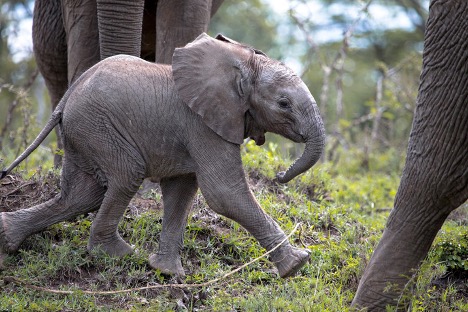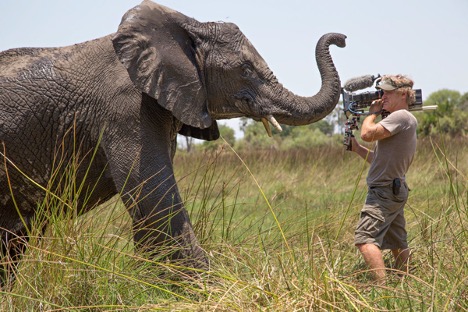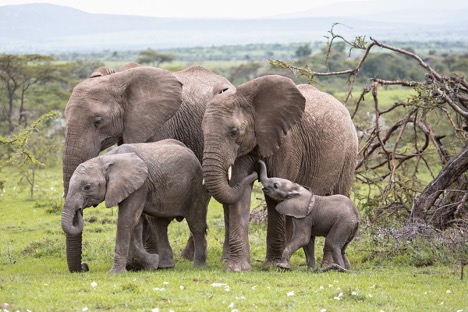Bob Poole — Recovery of Mozambique’s Gorongosa National Park
January 26 at McClaren Hall,
Flathead Valley Community College,
Paul D. Wachholz College Center
will bring Emmy-winning filmmaker
Bob Poole to Kalispell, MT
•
BY MIKE KORDENBROCK
January 21,2023
An elephant calf. Photo by Gina Poole
An upcoming “National Geographic Live” event at Flathead Valley Community College’s new Wachholz College Center will bring to Kalispell an award-winning filmmaker, with Montana ties, to discuss the story of a national park in Mozambique that has continued to rebound after a prolonged civil war that left the local wildlife population decimated.
It’s been a long time since Bob Poole has been to the Flathead Valley’s stretch of northwest Montana, but for the cinematographer and National Geographic speaker, any visit to the state is a reminder of the early years of his career.
Poole had an unusual upbringing for an American citizen, in that he grew up abroad. His youth was spent in the East Africa region, where his father was at one time a country director of the Peace Corps and was later an honorary warden of Tanzania National Parks. In describing his upbringing, Poole said that he grew up in Kenya. His work with National Geographic started when he was a teenager, according to the media company.
In the late 1970s, Poole enrolled at Montana State University in Bozeman. In the lead up to his first semester, he lived and worked on a ranch owned by friends of his parents, and ultimately his feeling of connection to the area, and love of skiing, was strong enough to keep him in Bozeman for more than a dozen years.
Bob Poole in the field. Photo by Gina Poole
During those years, Poole continued working for National Geographic, eventually landing a job for a project that would have him filming wolves. It prompted Poole to relocate to the Ketchum, Idaho area, where he’s been splitting his time between trips to Kenya and other African countries for almost 30 years.
Poole’s upcoming event at the Wachholz Center, called “Nature Roars Back,” tells the story of Gorongosa National Park, and its recovery from war-fueled hunting and poaching that left some local species nearly wiped out.
Poole explained that the war exacerbated poverty in the area. Some people were killing animals for food to survive. Others, including soldiers, would sometimes kill animals like elephants, so that their ivory tusks could be traded. There had been thousands of elephants, but Poole said there were just a few hundred left by the time he began filming in Gorongosa around 2008. Similarly, the local lion population had fallen from somewhere around 500 animals to just a handful.
“When people are starving, or are super hungry, or don’t have any other means, it’s hard to tell them they can’t eat meat, which is what they’ve done forever,” Poole said. “Without regulation of course, and without good land-use planning, things like that, it just disappears. And it goes away so fast, it’s just mind boggling. The thing with Gorongosa that was so exciting, was that I had watched in my lifetime so much wild space disappear, and then I got invited onto this project that was all about restoring this national park, which had been devastated by 30 years of civil war.”
Bob Poole films an elephant. Photo by Gina Poole
During the years he has spent filming in Gorongosa, Poole said he was able to watch wildlife recover, and that hand-in-hand with that, he was also able to watch local residents begin to benefit from and invest in the economic opportunity the park presented in its healthier state.
“I think it’s a very hopeful environmental success story,” Poole said. “Because we’re just losing stuff so fast in the natural world. We have so many problems that we’re facing, you know, that it’s nice. I think people leave feeling like there’s hope. There is hope out there.”
The show is a mixture of Poole’s own live narration and presentation, and clips from a six-part series on Gorongosa that he filmed for PBS and National Geographic. Mixed in with this story of devastation, recovery, and renewal, Poole said there are even moments of humor that audiences seem to particularly enjoy.
Not wanting to give the entire story away, Poole teased a scene he plans to show. The scene includes Poole’s sister, Joyce Poole, an elephant researcher who is “a world authority on elephant reproductive, communicative and cognitive behavior,” according to National Geographic. As Bob explained, he and his sister during this scene are working on documenting elephants exhibiting extreme aggression unlike anything he had seen up to that point in his career. As Poole explained, elephants are generally calm. Aggression is generally seen in young males who are reacting to testosterone for the first time, but typically elephants run the other way. This particular group had chased people, knocked over cars, and even crushed vehicles. Poole said he had built a protective cage for his Land Rover, but still wasn’t so sure about how close he wanted to get in to film the animals in question. His sister had other ideas.
“They’re seeing it unfold between the two of us. People just bust a gut every time, it’s just too funny. Because it’s just natural. It’s a brother and a sister talking about the most ridiculous thing.”
A family of elephants in Kenya. Photo by Gina Poole.
For those who are interested in exploring Poole’s work further, he and his sister Joyce collaborated on an upcoming four-part installment to James Cameron’s “Secrets” documentary series. Called “Secrets of the Elephants,” the documentary is narrated by Natalie Portman and will premiere on April 21 on National Geographic and be available the next day on Disney+.
•
Father of the Poole family
Bob Poole, the Emmy-winning filmmaker, is the son of Robert Poole, who was on the first staff of Ethiopia I Volunteers in the fall of 1962. He was only in Ethiopia for a few months and then was reassigned by Sarge Shriver to open the Malawi Peace Corps program.
After being director in Malawi, Poole, Sr. worked in a variety of countries for Peace Corps, and then became director of African operations for the African Wildlife Leadership Foundation.
Robert K. Poole, founder and director (1972-1975) of the Smithsonian-Peace Corps Environmental Program, was killed in an automobile accident in Nairobi, Kenya. At the time of his death, Poole was director of African operations for the African Wildlife Leadership Foundation.He died on May 12, 1978 at the age of 45. He was living in Nairobi.
A year before his death he was cited for bravery by the Kenyan Government for his efforts to rescue passengers trapped in railway cars after a train plunged from a bridge into a river on a route between Mombasa and Nairobi.





No comments yet.
Add your comment